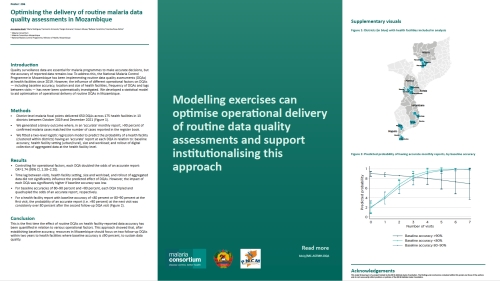Publications

Publication Date:
31/10/2022
Author:
Ann-Sophie Stratil
Maria Rodrigues
Sarmento Armando
Sergio Gomane
Kulssum Mussa
Baltazar Candrinho
Arantxa Roca-Feltrer
Type:
Poster

Optimising the delivery of routine malaria data quality assessments in Mozambique
Publication Date:
31/10/2022
Author:
Ann-Sophie Stratil
Maria Rodrigues
Sarmento Armando
Sergio Gomane
Kulssum Mussa
Baltazar Candrinho
Arantxa Roca-Feltrer
Type:
Poster

Publication Date:
31/10/2022
Author:
Ann-Sophie Stratil
Maria Rodrigues
Sarmento Armando
Sergio Gomane
Kulssum Mussa
Baltazar Candrinho
Arantxa Roca-Feltrer
Type:
Poster
Publication

Optimising the delivery of routine malaria data quality assessments in Mozambique
Publication Date:31/10/2022
Author:
Ann-Sophie Stratil
Maria Rodrigues
Sarmento Armando
Sergio Gomane
Kulssum Mussa
Baltazar Candrinho
Arantxa Roca-Feltrer
Type:
Poster
Modelling exercises can optimise operational delivery of routine data quality assessments and support institutionalising this approach.
Quality surveillance data are essential for malaria programmes to make accurate decisions, but the accuracy of reported data remains low. To address this, the National Malaria Control Programme in Mozambique has been implementing routine data quality assessments (DQAs) at health facilities since 2019. However, the influence of different operational factors on DQAs — including baseline accuracy, location and size of health facilities, frequency of DQAs and lags between visits — has never been systematically investigated. We developed a statistical model to aid optimisation of operational delivery of routine DQAs in Mozambique.
This poster was presented at the 71st annual meeting of the American Society of Tropical Medicine and Hygiene.
Country: Mozambique
Keywords: Digital health | Malaria | Monitoring and evaluation | Quality improvement | Research | SDGs
« Back to Publications